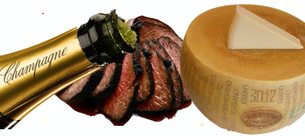 You know what sticklers we here in the U.S. are about protecting intellectual rights and how we bemoan the ocean of counterfeit imports flooding into our country? The funny thing is that our fastidiousness can be selective. Larry Olmested, a writer for Forbes, wrote a book called Real Food, Fake Food that reviews some of the foods that we Americans think we consume but we actually don’t. I can pretty much confirm that I have never had real Parmesan Cheese, and neither have you. Sure, waitpeople shave pungent blocks over our pasta to enhance the taste and restaurants call the block and shavings Parmesan, but it probably isn’t real Parmesan. Now if we were eating in Europe and we ordered Parmesan, restaurants would be legally be prevented from serving Parmigiano-Reggiano that wasn’t from a certain region in Italy. By the way, the 80 lb. wheel of Parmigiano Reggiano pictured above goes for $2,499 on Williams-Sonoma’s website, which may help explain why US citizens do not much complain about buying knockoffs. I cannot include myself in that group because I am a vegan and do not consume dairy products. The current issue of Newsweek has an article on Kobe beef. For most of the past decade and a half, the USDA made it illegal to import Kobe beef, which really can only be raised in Kobe Japan. Even when the ban was lifted almost none of the valuable meat made it to the USA. Japan barely exports any to our country and only to a handful of licensed restaurants. That’s not to say that you can’t easily find people selling Kobe-style cuts or Wagyu beef. Wagyu is the type of cow that ranchers in Kobe, Japan raise. The prices for non-Japanese brands vary tremendously and there really is no one policing to see if what you buy is actually Kobe Beef. There are online sellers who claim that they import Kobe certified steaks from Japan for about $500 a steak, but are the claims legitimate? Again, I’m vegan so I may be the last person on earth who to ask. You may have sipped bubbly on New Years Eve that everyone calls Champagne, but it probably wasn’t real Champagne. Like Parmesan and Kobe Beef, Champagne refers to a unique product produced in a very specific region in a foreign country. The region is the eponymous producer of the product, as with Kobe and Parmesan. In this instance, the region is Champagne, France. The intellectual property at issue is called a geographical indication, a type of trademark. The U.S. recognizes some GIs, including Idaho Potatoes, Florida Oranges, Napa Valley Vines, and Washington State Apples. Cognac is one of the few foreign GIs that our country recognizes. There is a Champagne Bureau in Washington, D.C. that lobbies to convince our country to legally allow only Champagne from Champagne, France to be labeled. “only wines made from the grapes grown and harvested in Champagne and then produced under the strict regulations of the Champagne appellation can bear the Champagne name. This unique location – called terroir in French – is integral to the wines that are produced and that is why the Champagne community and quality wine producers worldwide call for the all wines that bear the Champagne name to only come from Champagne, France.” The French’s frustration is palatable (like everything else French). They probably don’t understand why the U.S. continues to allow its citizens to drink fraudulently (from their vantage) labeled sparkling wine. The Champaign Bureau laments: “While most quality winemakers around the world do not misuse geographic indications, that is not the case in the United States. The Champagne Bureau, USA remains committed to promoting and protecting the Champagne name worldwide and is working with U.S. consumers, trade, and negotiators to ensure that the Champagne name is protected in the United States and that all mislabeling of U.S. sparkling wine is permanently banned in the United States.” I would drink to that, but I don’t drink. I wonder if Tofu is a region in China?
2 Comments
|
Oscar Gonzalez
Principal and a founding member of GRVR Attorneys. Archives
September 2016
Categories
All
|
- Home
- Who we are
-
Our Practice
- Customs and Import
- 301refunds
- Export
- Litigation
- Section 232 and 301 Tariffs
- Outsource Your Classification
- CBP Audits
- Fines, Penalties, Forfeitures, and Seizures
- Customs Brokers
- C-TPAT >
- Foreign-Trade Zones
- Antidumping and Countervailing Duties
- Intellectual Property RIghts
- Foreign Corrupt Practices Act
- Manifest Confidentiality
- Contracts and Incoterms
- False Claims Act and Whistleblower
- Blog
- Resources
- Calendar and Events
- Best Customs Broker Exam Course
- Contact
 RSS Feed
RSS Feed
